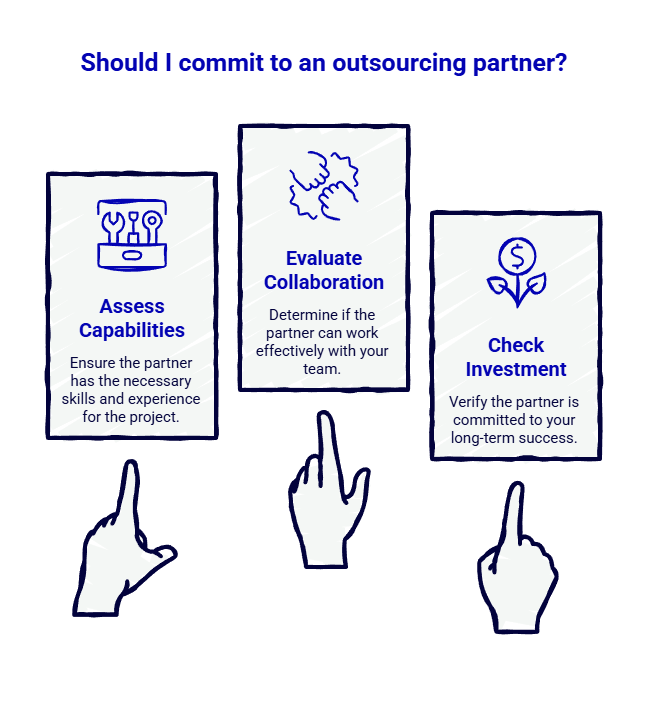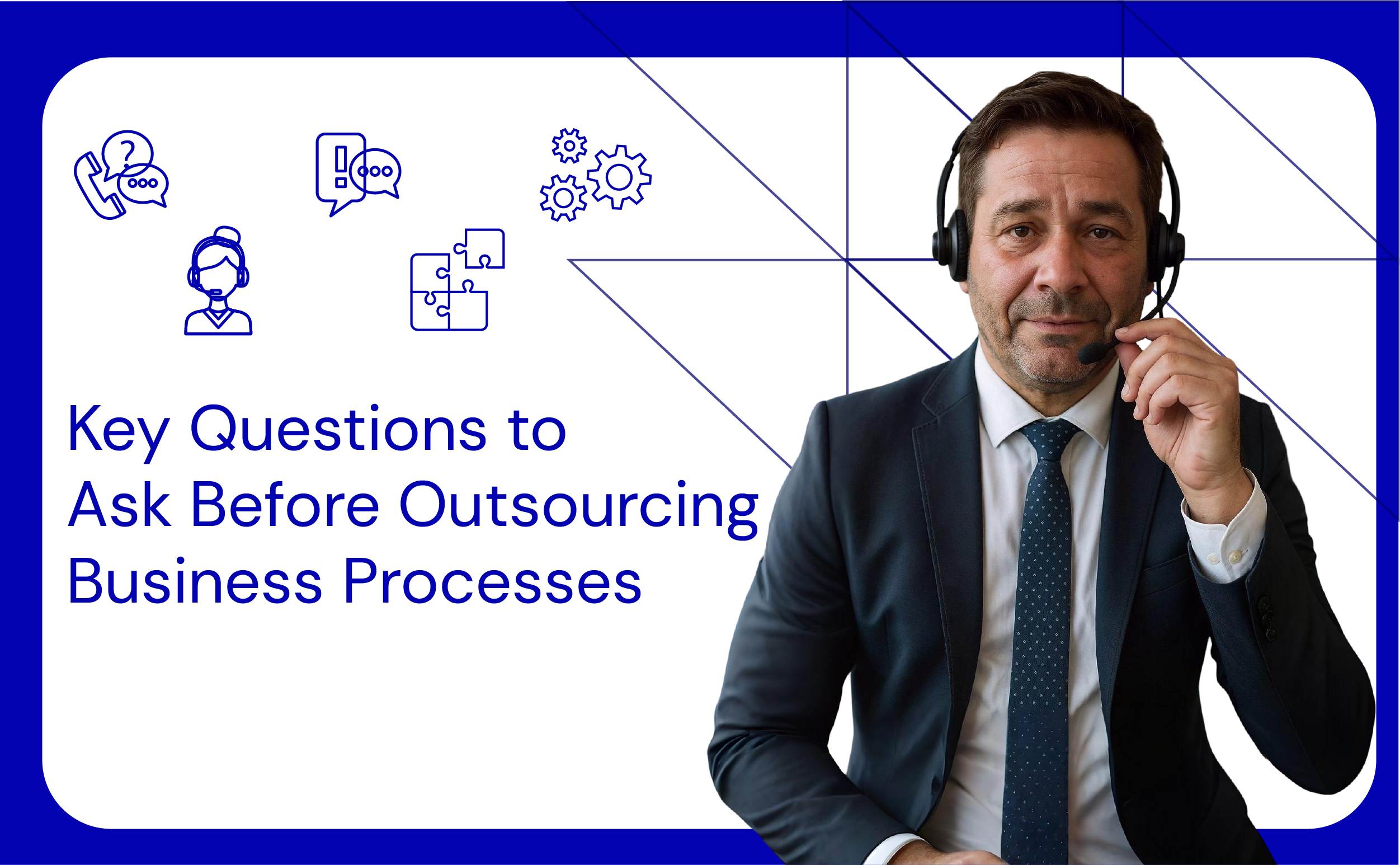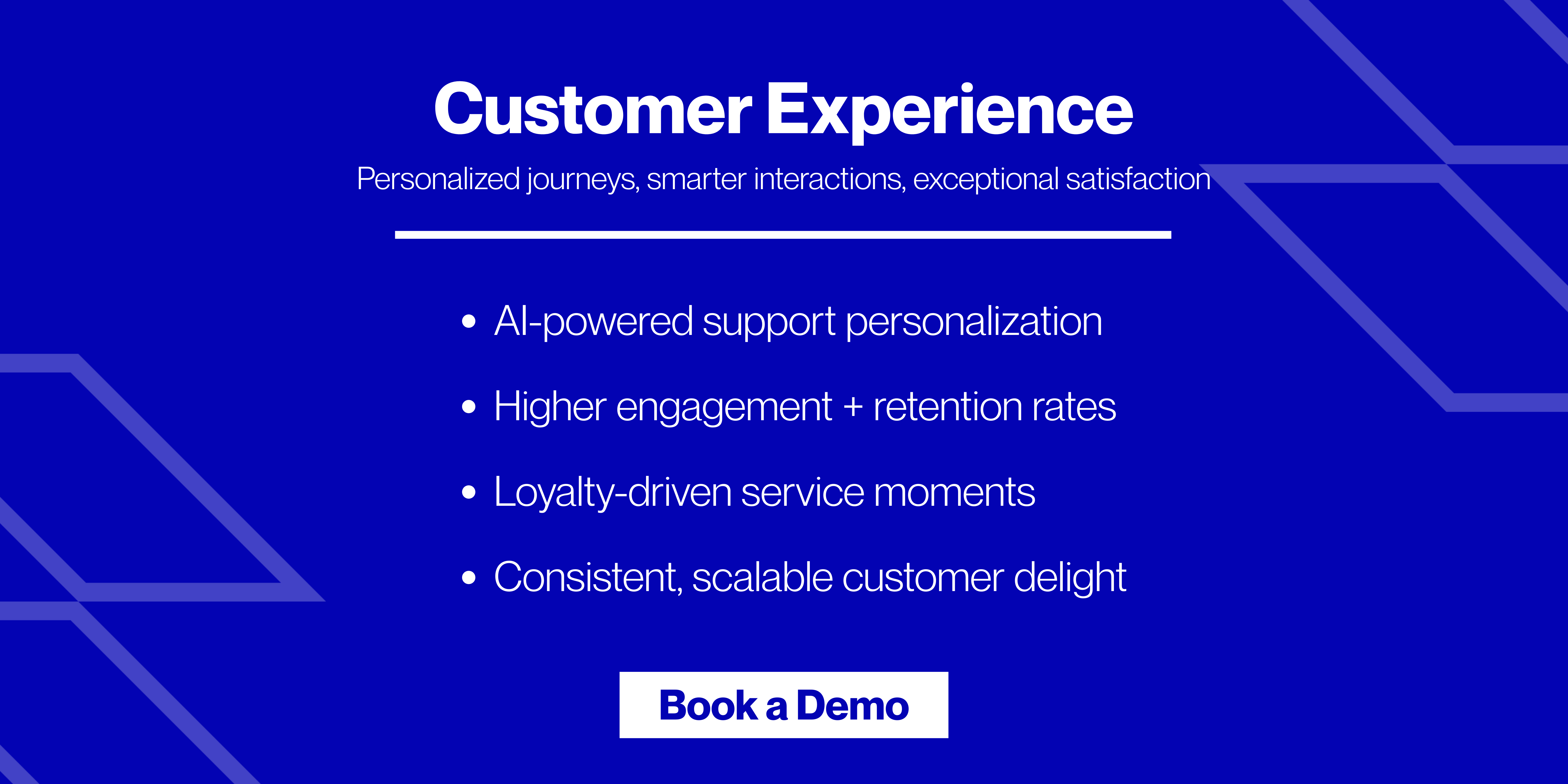Key Takeaways
- Asking the right outsourcing questions up front helps avoid confusion, delays and budget surprises later on.
- Key areas to clarify include communication, turnaround times, pricing structure and data security protocols.
- A strong outsourcing partner should be transparent, responsive and aligned with your business goals.
- Always start with a small engagement or pilot project before committing to a long-term partnership.
Why Does Asking the Right Outsourcing Questions Matters
Outsourcing sounds amazing on paper in 2025. You get to offload time-consuming tasks, tap into expert help, and keep your overhead lean by reduce operating costs by an average of at least 15%. No wonder, then, that the global BPO market is valued at a whopping $414 billion.
Outsourcing can certainly be a big win for your business in 2025, but only if you ask the right questions before jumping in. You’re trusting an external partner with part of your business—your reputation, your timelines, your customer experience. And if that relationship isn’t set up right from the start? Research shows that 25% of outsourcing relationships fail within two years, and 50% fail within five. You could be in for miscommunication, missed expectations, and a lot of unnecessary stress.
That’s why it is especially critical in 2025 for fast-scaling brands, particularly for consumer brands and D2C companies in the US, UK & Australia, to gain potential BPO partners. This becomes true when you are in customer support or customer experience roles managing lean teams across countries like the US, UK or Australia.
Here’s what asking the right questions upfront in 2025 gives you:
- Clarity on how the partnership will actually work
- Confidence that the team knows what they’re doing
- Protection from surprises down the road
So take a moment and treat this like what it really is: due diligence. Ask the “what ifs.” Ask about their process, their pricing, their past projects. Ask how they handle hiccups. Ask what they do really, really well—and what might be outside their scope.
When you ask the right questions up front, you avoid the “I wish we’d talked about this earlier” moment down the road. And that means less friction, fewer surprises, and way more time spent actually getting things done. Let’s dive right into the exact questions to ask before you commit to an outsourcing partner.
Top Outsourcing Questions to Ask Before You Commit

Choosing an outsourcing partner is like choosing a co-founder for a very specific part of your business. You want someone who’s capable, collaborative, and invested in your success—not just someone who checks a few boxes on a proposal.
So before you sign any contracts or kick off a project, make sure you ask these nine essential outsourcing questions.
1. What experience do you have with businesses like mine?
This question is a key question on outsourcing in customer experience because it cuts straight to the heart of fit. You’re not just looking for someone who knows how to do the work—you want someone who understands the context you’re operating in. If you’re a startup or a lean team, ask:
- “Have you worked with early-stage companies before?”
- “Can you share examples of similar businesses you’ve supported?”
- “What kinds of outcomes have you delivered for companies like ours?”
You want them to talk about real clients, real challenges, and how they helped solve them. A good partner will be happy to show they’ve walked this road before—and helped someone just like you cross the finish line. For example, Atidiv helped a New York-based startup achieve 80% time savings and 99% accuracy through outsourcing workflows (read the full case study here).
2. Can you walk me through your onboarding process?
This is one of the most overlooked but essential questions to ask when outsourcing tasks: Ask
1.Who will be responsible for communicating?
2. How often will we check in?
3.What communication tools do you use?
- “What happens after we sign?”
- “How do you get familiar with our brand, voice, and goals?”
- “What tools will we use to stay in sync?”
You’re looking for a real onboarding plan. The first 1–2 weeks should feel organized, not improvised. A partner that can clearly outline a structured, week-by-week onboarding plan demonstrates operational maturity. Great partners will also ask for material that helps them speak your language and stay on-message. Atidiv, for instance, runs dedicated onboarding sprints that replicate client workflows and communication structures before full transition.
3. How do you communicate and how often?
Even the most skilled outsourcing partner can leave you frustrated if they disappear halfway through a project or leave your emails hanging for days. That’s why how they communicate (and how often) matters just as much as what they deliver.
Here’s what you should ask them—and what to listen for:
- “Who will be my main point of contact?”: You want to know exactly who’s accountable—and who you can turn to if things get off track.
- “How often will we meet, update, or check in?”: Some projects need weekly calls. Others might only need a status update over WhatsApp every few days. What matters is that the rhythm works for you, and that it’s agreed on ahead of time.
- “What tools will we use to stay connected?”: Will they use your project management software or invite you to theirs? Are updates sent over email, or do they prefer async Slack threads? The clearer the setup, the smoother the flow.
Look for providers that maintain proactive reporting and scheduled syncs, not reactive updates.
4. What does your pricing structure include (and not include)?
Money talk is not always fun, but it’s absolutely essential, because if there’s one thing that can derail an otherwise great outsourcing experience, it’s surprise costs.
Here’s what you should ask them to walk you through:
- “What’s included in the rate?”
- “Is your pricing hourly, project-based, or retainer?”
- “Are revisions or edits included?”
- “What happens if we change the scope?”
Get clarity on what you’re paying for so there are no “oh, that costs extra” moments later. Make sure you understand what model they’re using, and when the clock starts ticking. Learn about how they handle scope creep and additional requests before you’re mid-project.
For example, when Atidiv helped a client save over $450K in annual makegoods through process optimization, transparent pricing and continuous reporting were key — learn how here.
5. What does your typical turnaround time look like?
While we all want things done yesterday, in reality, speed only matters if it comes with consistency. That’s why this question is key. It’s not just about how fast they can deliver—it’s about how reliably they hit deadlines without sacrificing quality. Here’s how to break it down when you’re chatting with a potential partner:
- “How long do projects like this usually take?”
- “Can you meet deadlines during busy periods?”
- “Do you offer expedited delivery if we’re in a rush?”
Ask how they handle busy seasons and workload balancing. And find out if they accommodate a rush job? And if so, do they charge any premium fee? Look for predictable delivery models rather than ad hoc commitments.
6. How do you handle mistakes or missed deadlines?
This question isn’t about expecting perfection. It’s about looking for accountability. Here’s what you want to ask:
- “How do you communicate when something goes wrong?”
- “What’s your process for corrections?”
- “What happens if a deadline slips?”
A solid partner will shoot you a quick message, own the issue, and let you know what’s being done to fix it. You want a partner who’s not afraid to say: “If something goes wrong, here’s exactly how we make it right.”
7. Can I see references or client testimonials?
Asking for testimonials or the chance to chat with a past client isn’t just due diligence—it’s smart business. Here’s how to approach it:
- “Do you have any testimonials or reviews from similar businesses?”: Look for reviews from companies your size or in your industry. That context makes all the difference.
- “Would you be willing to connect me with a current or former client?”: Even a quick 10-minute call can give you massive insight. Ask that client what they liked, what challenges they faced, and whether they’d hire the partner again.
- “Can you walk me through a past project similar to ours?”: This lets them show off a bit—and gives you a chance to hear how they think through challenges and deliver results.
If they can’t share examples like Atidiv’s $20M+ savings and 95%+ quality delivery for a business aggregator, that’s a red flag — see the case study here.
8. How do you ensure data security and confidentiality?
If you’re outsourcing any part of your business that touches customer data, financials, or intellectual property, Questions to ask QA outsourcing partner must include data protection, where this isn’t optional:
- “Will we sign a Non-Disclosure Agreement (NDA)?”
- “How is sensitive data stored and who has access to it?”
- “Are you compliant with privacy laws like GDPR or HIPAA?”
The right outsourcing partner should treat your data with the same level of care and protection as you do (or better). Top-tier partners will have multi-layered security protocols, compliance certifications and data governance teams.
9. What does success look like to you in this partnership?
This is one of the most revealing ones you can ask. When someone tells you what they consider success, you get a real peek behind the curtain. You’ll learn what they prioritize, how they think about their clients, and whether they’re just chasing a paycheck or looking to build something meaningful alongside you. Ask them:
- “What does a successful engagement look like from your side?”
- “What kind of results do you aim for with your clients?”
- “What do you value most in your client relationships?”
Aligned goals build sustainable partnerships. The best providers, like Atidiv, measure success not just in delivery metrics but in client retention, quality improvement and customer satisfaction impact.
When you’re aligned on what success means, everything else flows easier. So don’t skip this question. It might sound philosophical, but it’s actually one of the most practical tools for finding a partner who’s genuinely invested in your outcomes.
Ask Smart, Scale Smarter
When done right, outsourcing helps you move faster, stay lean, and tap into expert support without ballooning your headcount. It can free up your internal team, speed up launches, and keep you laser-focused on growth. But, it only works if you’re clear from the beginning. And that starts with asking the right questions. When you take the time to ask smart outsourcing questions, especially the right questions to ask before outsourcing customer service or those critical questions to ask a QA outsourcing partner:
- You set realistic expectations
- You protect your budget and timeline
- You choose partners who actually get your business
- And you build the kind of relationship that adds value
So, whether you’re outsourcing one project or building a full remote team, remember that smart outsourcing starts with smart conversations.
When done right, outsourcing helps you:
- Scale without increasing expenses
- Improve speed and efficiency
- Free internal teams to focus on strategy and growth
If you’re looking for an outsourcing partner that’s not afraid of having such tough conversations, consider Atidiv. We offer customer experience outsourcing solutions , finance & accounting, digital marketing and content moderation to help businesses like yours grow. We’ll help you build a streamlined, stress-free process that gets you the results you want—without the chaos, confusion, or growing pains.Our team supports fast-scaling D2C and consumer brands across the US, UK & Australia, building cost-effective, high-performance operations that grow with you.
Partner with Atidiv to scale smarter!
FAQs on Key Questions to Ask Before Outsourcing Business Processes
1. Why are outsourcing questions important?
Because they help you spot red flags early, set clear expectations, and choose a partner who can actually deliver what you need.
2. What’s the most important question to ask an outsourcing provider?
Start with: “Have you worked with businesses like mine before?” It’ll help you gauge experience and industry fit right away.
3. Should I be worried about hidden costs when outsourcing?
Yes. Always ask for a detailed breakdown of pricing and what’s included to avoid surprise fees down the line.
4. How can I make sure communication runs smoothly?
Ask how they typically communicate (Slack, email, Zoom) and how often you’ll get updates. Clear, regular check-ins are a must.
5. When’s the right time to outsource?
As soon as tasks are slowing you down or falling outside your skill set. Outsourcing helps you focus on growth while staying efficient.

